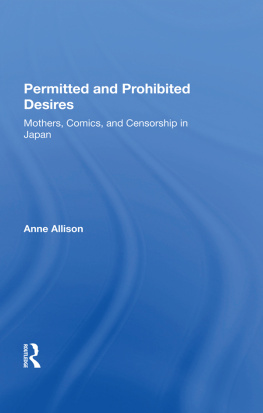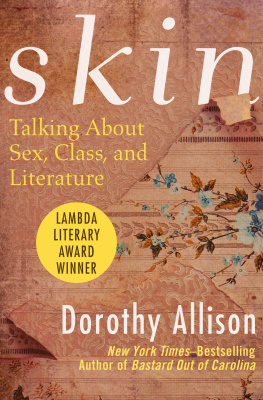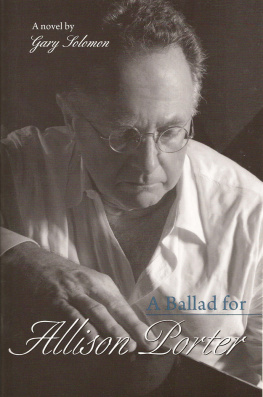The University of Chicago Press, Chicago 60637
The University of Chicago Press, Ltd., London
1994 by The University of Chicago
All rights reserved. Published 1994
Printed in the United States of America
09 08 07 06 7 8 9 10
ISBN 0-226-01487-8 (paper)
ISBN 978-0-226-01488-3 (e-book)
Library of Congress Cataloging-in-Publication Data
Allison, Anne, 1950
Nightwork: sexuality, pleasure, and corporate masculinity in a Tokyo hostess club / Anne Allison.
p. cm.
Includes bibliographical references and index.
1. Bars (Drinking establishments)JapanTokyo. 2. EntertainingJapanTokyo. 3. Male friendshipJapanTokyo. 4. Corporate cultureJapanTokyo. 5. Cocktail serversJapanTokyo. 6. Tokyo (Japan)Social life and customs. I. Title..
GT3415.J3A45 1994
394.1 2 0952135dc20 | 93-34877 |
CIP |
 The paper used in this publication meets the minimum requirements of the American National Standard for Information SciencesPermanence of Paper for Printed Library Materials, ANSI Z39.481992.
The paper used in this publication meets the minimum requirements of the American National Standard for Information SciencesPermanence of Paper for Printed Library Materials, ANSI Z39.481992.
Nightwork
Sexuality, Pleasure, and Corporate Masculinity in a Tokyo Hostess Club

Anne Allison
The University of Chicago Press
Chicago and London
For Adam and David
Contents
Acknowledgments
During the long years I have spent conceiving, executing, and writing up this project, its subjectcorporate fraternizing in a Tokyo hostess clubhas been often greeted with reactions of bewilderment, bemusement, or even out-and-out rejection. Not quite standard for the field of Japanology, somewhat unusual in the discipline of anthropology, curiously male-oriented for feminist scholarship, and uncomfortably sexual for serious or easy discussion (for many, I found, both in Japan and the United States, in both academic and nonacademic settings), this study has been frequently treated as controversial at best, and weird, as my children fear, at worst.
That there have been other reactions to this work I am most grateful, and to those persons who have given me support and encouragement at various stages of the project I would like to give thanks. At the beginning, when I was entertaining the so-called antiwar clause in the Japanese constitution as a subject for doctoral research as a graduate student in anthropology at the University of Chicago, it was Harry Harootunian who dissuaded me and suggested an area in gendered relations instead. When I decided on the topic of corporate entertainment in the nightlife, it was Harry, as a member of my dissertation committee, who guided, supported, and helped shape this study and my ability to carry it through more than any other single person. He has been my mentor, critic, supporter, and friend during this long journey, and my debt to him, in true Japanese fashion, can never be repaid.
Bernie Cohn challenged and sharpened the issues I was pursuing, and to him and the other member of my committee, David Schneider, whose interest and support in my project has been unceasing, I am deeply grateful. Other faculty members and graduate students in the Department of Anthropology were also supportive; in particular, I thank Jean Comaroff, Joyce Canaan, and John Comaroff for their input at various stages of the project. I am also appreciative of the support I received from faculty of the Department of Far Eastern Languages and Civilizations over the yearsBill Sibley, Bernie Silberman, Norma Field, and Tetsuo Najita.
While conducting research in Tokyo, I was greatly assisted by a number of Japanese who were willing to talk to me about issues that others were not and to accept me in the roles of hostess/anthropologist/inquiring foreigner I variously assumed. To the Mama of Bijo, the hostess club I studied, I am especially indebted. She was gracious and gentle in handling her foreign charge, and because of this acceptance the other Bijo staffthe waiters, piano player, cook, manager, and hostessestreated me with an openness that enabled my work. To all of them, and to the customers who willingly conversed with me about the very behavior they were engaging in as we spoke, I am thankful. The manager of Bijo was particularly helpful: he guided me as both practitioner and theoretician of hostessing while I was employed at Bijo, and he gave me fifteen hours of intense interviews six years later (198788), when I returned to Tokyo for a postdoctoral fellowship. His insights and observations about the mizu shbai and its interconnections of sexuality, maleness, and corporate interest have been invaluable in helping me understand the behaviors I write about in this book. I thank him deeply for his willingness to share this world with me and to speak about it with such forthrightness and clarity.
There were many others in Japan who spoke with me formally and informally, in interview or casual conversation, about various behaviors I touch upon in these pages. To all these people I give my thanks, and particularly to Tomita Kichi of JASE (The Japanese Association for Sex Education), Narabayashi Yoshi, and Wagatsuma Takeshi. To friends and colleagues I am also indebted. Miriam Silverberg was in Tokyo while I conducted fieldwork, and her humor, friendship, and intellectual support are as valuable to me today as they were then. Steven Platzer was a great resource in helping me think through this project at different stages, make connectionspersonal and intellectualto carry it through, and find the wherewithal to enter a hostess club and stay for four months. At the University of Colorado, where I wrote this manuscript, colleagues and students were enthusiastic and indulgent as I rehashed my work during numerous presentations, seminars, class lectures, and dinner conversations. For their patience and support I would like to thank particularly Dennis McGilvray Paul Shankman, Payson Sheets, Darna Dufour, Margaret Eisenhart, Linda White, Susan Erikson, Sawa Becker, Kate Hartzell, Sarah Makarechian, Nancy Ehrenreich, and Steve Snyder. In day-to-day coping, Mark Balas helped me to rediscover humor and hope at times that were stressful and hard. At all times, Charlie Piot acted as friend, colleague, and support system par excellence. To these two, my gratitude is deep.
In the stages of submission to and copyediting by the University of Chicago Press, I would like to thank Debbie Otterstrom for the weeks she spent typing the manuscript with far greater proficiency than I could have managed. I was much helped by the comments of two anonymous reviewers; one of these read the manuscript particularly closely and suggested its title, and for this attention and the suggestions it generated I am very grateful. I appreciate as well the work of two copyeditors, Michelle Asakawa and Wilma Ebbitt, which has benefited the manuscripts style.
I would like to thank the Japan Foundation for a postdoctoral fellowship that made it possible for me to conduct some of the interviews used in this book. The Department of Far Eastern Languages and Civilizations at the University of Chicago was continuously generous at different points in my graduate studies, providing funds for language study in Japan and for dissertation write-up; granting a postdoctoral fellowship to teach about Japan; and nominating me for the Rikky UniversityUniversity of Chicago joint fellowship that partially supported my fieldwork. I am also grateful to Rikky University for the associate student status and scholarship it gave me, which further facilitated my fieldwork.
To my family, I give final thanks. My parents and siblings have always been proud of my work and supportive of its direction, despite the unconventionality of its subject. My children, David and Adam, are unsure of what this book is actually about but have endured with me the years of its production. I express my love for them with this dedication.
Next page










 The paper used in this publication meets the minimum requirements of the American National Standard for Information SciencesPermanence of Paper for Printed Library Materials, ANSI Z39.481992.
The paper used in this publication meets the minimum requirements of the American National Standard for Information SciencesPermanence of Paper for Printed Library Materials, ANSI Z39.481992.